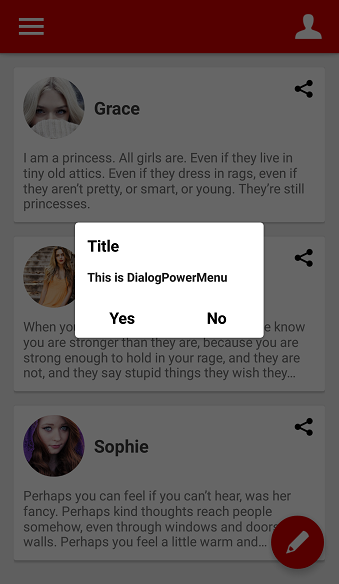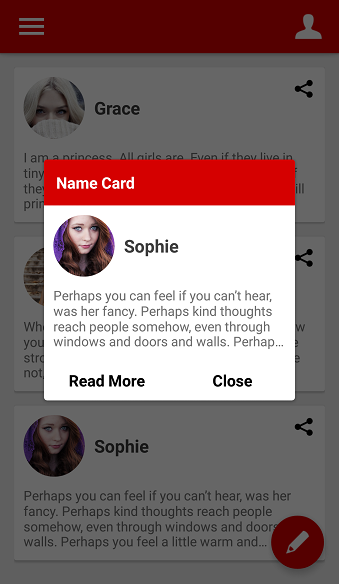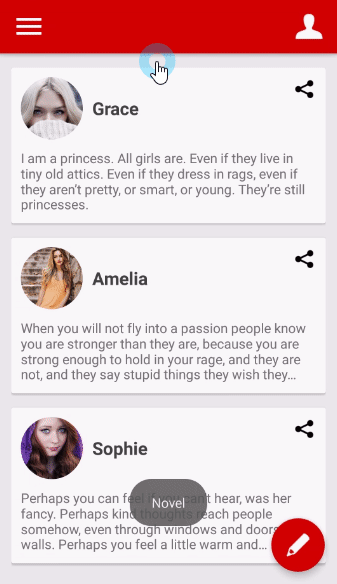


A library that let you implement popup so easily.
dependencies {
implementation "com.github.skydoves:powermenu:2.0.5"
}This is a basic example on a screenshot. You can create PowerMenu using PowerMenu.Builder.
PowerMenu powerMenu = new PowerMenu.Builder(context)
.addItemList(list) // list has "Novel", "Poerty", "Art"
.addItem(new PowerMenuItem("Journals", false))
.addItem(new PowerMenuItem("Travel", false))
.setAnimation(MenuAnimation.SHOWUP_TOP_LEFT) // Animation start point (TOP | LEFT)
.setMenuRadius(10f)
.setMenuShadow(10f)
.setTextColor(context.getResources().getColor(R.color.md_grey_800))
.setSelectedTextColor(Color.WHITE)
.setMenuColor(Color.WHITE)
.setSelectedMenuColor(context.getResources().getColor(R.color.colorPrimary))
.setOnMenuItemClickListener(onMenuItemClickListener)
.build();You can add items or an item list using PowerMenuItem class. This is how to initialize PowerMenuItem.
PowerMenuItem powerMenuItem = new PowerMenuItem("Travel", true);The first argument is an item title, and the other is selected status.
If selected status is true, the item's text and background color be changed by your settings like below.
.setSelectedTextColor(Color.WHITE)
.setSelectedMenuColor(context.getResources().getColor(R.color.colorPrimary))OnMenuItemClickListener is an interface definition for a callback to be invoked when a menu item is clicked.
private OnMenuItemClickListener<PowerMenuItem> onMenuItemClickListener = new OnMenuItemClickListener<PowerMenuItem>() {
@Override
public void onItemClick(int position, PowerMenuItem item) {
Toast.makeText(getBaseContext(), item.getTitle(), Toast.LENGTH_SHORT).show();
powerMenu.setSelectedPosition(position); // change selected item
powerMenu.dismiss();
}
};After declaring the listener, you should set about PowerMenu using below method.
.setOnMenuItemClickListener(onMenuItemClickListener)The last, just show your popup! Various show & dismiss methods.
powerMenu.showAsDropDown(view); // view is an anchorYou can customizing item styles using CustomPowerMenu and your customized adapter.
Below is how to customizing popup item that has an icon.
At first, you should create your item model.
public class IconPowerMenuItem {
private Drawable icon;
private String title;
public IconPowerMenuItem(Drawable icon, String title) {
this.icon = icon;
this.title = title;
}
// --- skipped setter and getter methods
}And next, you should create your own customized XML layout and adapter.
Custom Adapter should extend MenuBaseAdapter<YOUR_ITEM_MODEL>.
public class IconMenuAdapter extends MenuBaseAdapter<IconPowerMenuItem> {
@Override
public View getView(int index, View view, ViewGroup viewGroup) {
final Context context = viewGroup.getContext();
if(view == null) {
LayoutInflater inflater = (LayoutInflater) context.getSystemService(Context.LAYOUT_INFLATER_SERVICE);
view = inflater.inflate(R.layout.item_icon_menu, viewGroup, false);
}
IconPowerMenuItem item = (IconPowerMenuItem) getItem(index);
final ImageView icon = view.findViewById(R.id.item_icon);
icon.setImageDrawable(item.getIcon());
final TextView title = view.findViewById(R.id.item_title);
title.setText(item.getTitle());
return super.getView(index, view, viewGroup);
}
}The last, create CustomPowerMenu and attach onMenuItemClickListener.
CustomPowerMenu customPowerMenu = new CustomPowerMenu.Builder<>(context, new IconMenuAdapter())
.addItem(new IconPowerMenuItem(context.getResources().getDrawable(R.drawable.ic_wechat), "WeChat"))
.addItem(new IconPowerMenuItem(context.getResources().getDrawable(R.drawable.ic_facebook), "Facebook"))
.addItem(new IconPowerMenuItem(context.getResources().getDrawable(R.drawable.ic_twitter), "Twitter"))
.addItem(new IconPowerMenuItem(context.getResources().getDrawable(R.drawable.ic_line), "Line"))
.setOnMenuItemClickListener(onIconMenuItemClickListener)
.setAnimation(MenuAnimation.SHOWUP_TOP_RIGHT)
.setMenuRadius(10f)
.setMenuShadow(10f)
.build();private OnMenuItemClickListener<IconPowerMenuItem> onIconMenuItemClickListener = new OnMenuItemClickListener<IconPowerMenuItem>() {
@Override
public void onItemClick(int position, IconPowerMenuItem item) {
Toast.makeText(getBaseContext(), item.getTitle(), Toast.LENGTH_SHORT).show();
iconMenu.dismiss();
}
};You can create seems like dialogs using PowerMenu.


Below example is normal dialog. Dialogs are composed of a header, footer and body.
PowerMenu powerMenu = new PowerMenu.Builder(context)
.setHeaderView(R.layout.layout_dialog_header) // header used for title
.setFooterView(R.layout.layout_dialog_footer) // footer used for yes and no buttons
.addItem(new PowerMenuItem("This is DialogPowerMenu", false)) // this is body
.setLifecycleOwner(lifecycleOwner)
.setAnimation(MenuAnimation.SHOW_UP_CENTER)
.setMenuRadius(10f)
.setMenuShadow(10f)
.setWith(600)
.setSelectedEffect(false)
.build();And you can create a customized dialog like below.
CustomPowerMenu customPowerMenu = new CustomPowerMenu.Builder<>(context, new CustomDialogMenuAdapter())
.setHeaderView(R.layout.layout_custom_dialog_header) // header used for title
.setFooterView(R.layout.layout_custom_dialog_footer) // footer uesd for Read More and Close buttons
// this is body
.addItem(new NameCardMenuItem(context.getResources().getDrawable(R.drawable.face3), "Sophie", context.getString(R.string.board3)))
.setLifecycleOwner(lifecycleOwner)
.setAnimation(MenuAnimation.SHOW_UP_CENTER)
.setWith(800)
.setMenuRadius(10f)
.setMenuShadow(10f)
.build();You can show a popup by anchors.
.showAsAnchorLeftTop(view)
.showAsAnchorLeftBottom(view)
.showAsAnchorRightTop(view) // with .setAnimation(MenuAnimation.SHOWUP_TOP_RIGHT) looks better
.showAsAnchorRightBottom(view) // with .setAnimation(MenuAnimation.SHOWUP_TOP_RIGHT) looks better
.showAsAnchorCenter(view) // with .setAnimation(MenuAnimation.SHOW_UP_CENTER) looks betteror you can customize your own position using the below methods.
.getContentViewWidth() // return popup's measured width
.getContentViewHeight() // return popup's measured heightlike this :
// show popup at the center of an anchor. it's same using .showAsAnchorCenter
hamburgerMenu.showAsDropDown(view,
view.getMeasuredWidth()/2 - hamburgerMenu.getContentViewWidth(),
-view.getMeasuredHeight()/2 - hamburgerMenu.getContentViewHeight());This is options about the background.
.setShowBackground(false) // do not showing background
.setTouchInterceptor(onTouchListener) // set touch listener what outside of popup.
.setFocusable(true) // do not allow touch outside of popup.addItemList(list)
.addItem(new PowerMenuItem("Journals", false)) // add a PowerMenuItem
.addItem(3, new PowerMenuItem("Travel", false)) // add a PowerMenuItem at position 3
.setLifecycleOwner(lifecycleOwner) // set LifecycleOwner about activity or fragment. This helps avoid a memory leak.
.setWith(300) // set popup width size
.setHeight(400) // set popup height size
.setMenuRadius(10f) // set popup corner radius
.setMenuShadow(10f) // set popup shadow
.setDivider(new ColorDrawable(context.getResources().getColor(R.color.md_blue_grey_300))) // set a divider
.setDividerHeight(1) // set divider's height
.setAnimation(MenuAnimation.FADE) // set Animation
.setTextColor(context.getResources().getColor(R.color.md_grey_800)) // set normoal item text color
.setSelectedTextColor(Color.WHITE) // set selected item text color
.setMenuColor(Color.WHITE) // set normoal item background color
.setSelectedMenuColor(context.getResources().getColor(R.color.colorPrimary)) // set selected item background color
.setSelectedEffect(false) // if false, no apply selected colors(text, background)
.setOnMenuItemClickListener(onMenuItemClickListener) // add an item click listener
.setOnDismissListener(OnDismissedListener onDismissListener) // add a menu dismiss listener
.setHeaderView(int layout) // set a fixed view to appear at the top of the list
.setHeaderView(View view) // set a fixed view to appear at the top of the list
.setFooterView(View v) // set a fixed view to appear at the bottom of the list
.setFooterView(View view) // set a fixed view to appear at the bottom of the list
.setSelection(int position) // scroll to position
.getSelectedPosition() // get the last selected item's position. if not selected before, returns -1 .
.getHeaderView() // get header view
.getFooterView() // get footer view
.getMenuListView() // return menu ListView on Powermenu.setBackgroundAlpha(0.7f) // set background's alpha
.setBackgroundColor(Color.GRAY) // set background's color
.setShowBackground(false) // set showing background
.setOnBackgroundClickListener(onClickListener) // set a background click listener. the default is dismissing the popup..showAsDropDown(View anchor); // shows a popup as drop-down below an anchor view
.showAsDropDown(View anchor, -370, 0); // showAsDropDown with offset (xoff, yoff)
.showAtCenter(View layout); // shows a popup at anchor view's center
.showAtCenter(View layout, 0, 0); // showAtCenter with offset (xoff, yoff)
.showAtLocation(View anchor, int xOff, int yOff)
.showAtLocation(View anchor, int gravity, int xOff, int yOff)
.isShowing(); return true or false
.dismiss(); // dismiss popupDialog, PopupWindow and etc.. have memory leak issue if not dismissed before activity or fragment are destroyed.
But Lifecycles are now also integrated with the Support Library since Architecture Components 1.0 Stable released.
So you can solve memory leak issue so easily.
Just use setLifecycleOwner method. Then dismiss method will be called automatically before activity or fragment are destroyed.
.setLifecycleOwner(lifecycleOwner)Copyright 2017 skydoves
Licensed under the Apache License, Version 2.0 (the "License");
you may not use this file except in compliance with the License.
You may obtain a copy of the License at
http://www.apache.org/licenses/LICENSE-2.0
Unless required by applicable law or agreed to in writing, software
distributed under the License is distributed on an "AS IS" BASIS,
WITHOUT WARRANTIES OR CONDITIONS OF ANY KIND, either express or implied.
See the License for the specific language governing permissions and
limitations under the License.



